Covid-19: Restrictions have gained NI 'important ground'
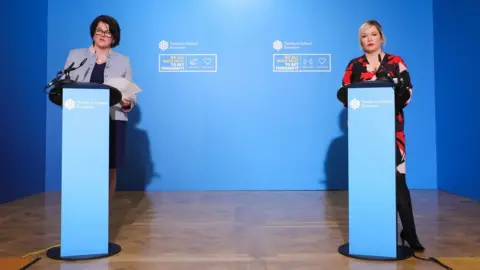 Kelvin Boyes/Press Eye/PA Wire
Kelvin Boyes/Press Eye/PA WireThe current Covid-19 restrictions and efforts of the public have gained "important ground" with NI's R-rate dropping to about 0.7, First Minister Arlene Foster has said.
But she confirmed no decision would be taken on Thursday about whether to extend hospitality restrictions.
The executive has been advised that hospitality should remain closed for another two weeks.
The measures, initially imposed on 16 October, are due to end next Friday.
Hospitality businesses have called for clarity as soon as possible.
Mrs Foster said ministers had a "comprehensive discussion" about what may be needed after the current restrictions end.
Announcements at 'earliest opportunity'
Speaking at a press conference at Stormont on Thursday, Mrs Foster said it was "clear over the last three weeks that your efforts have gained us important ground".
She said Northern Ireland's R-rate - or reproduction number - had fallen to about 0.7, but that the number of patients requiring intensive care was still high.
It's the lowest R-rate recorded in Northern Ireland since the end of July, although the reopening of schools at the beginning of this week is not taken into account by the latest figure.
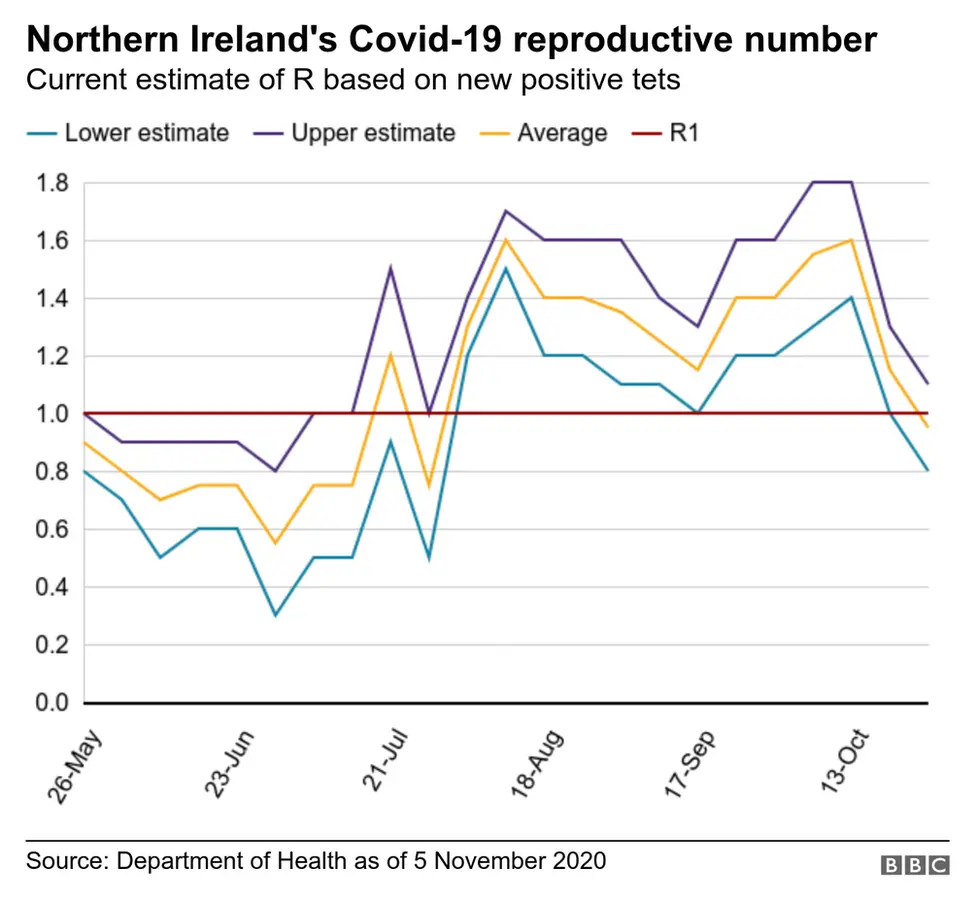
Mrs Foster also warned that there was still "more to do" in terms of reducing the spread of infection.
The executive will intensify engagement with the hospitality sector next week, as ministers plan a "safe and sustainable way forward for the industry", she added.
"We will make our announcements at the earliest possible opportunity to provide businesses with certainty and allow people to see the plan.
"Positive change is coming as work advances on our track and trace system, and developments of a vaccine, but for the immediate future we must all do everything we can to continue to protect lives."
A Department of Health proposal, seen by BBC News NI, indicates that a two-week extension of the restrictions on hospitality until the end of November could mean the possibility of avoiding further interventions before Christmas.
Deputy First Minister Michelle O'Neill said it was "not ideal" that the executive was not announcing a decision on whether to extend the current restrictions yet.
"We want to get to the point where we can be definitive but clearly there is more work that the Department of Health needs to take on board," she added.
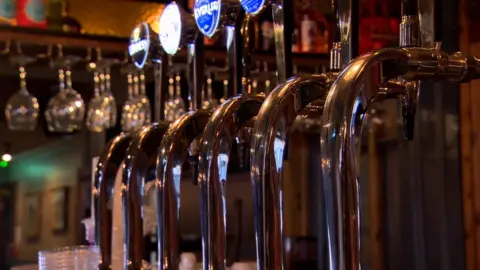
"There hasn't been a strong enough conversation between the sector and the department about what can be done."
Discussions with hospitality representatives are likely to continue over the weekend and ministers are expected to make an announcement in the assembly early next week.
"We are facing into a difficult few months but there is also room for hope," said the deputy first minister.
"This is a complex situation we are dealing with - we have to look at everything in the round."
Later, on BBC's The View, Infrastructure Minister Nichola Mallon called for a two-week extension to the current Covid-19 restrictions.
She added the executive needed to provide "financial support to those businesses who are affected by those decisions".
What do the latest Covid figures show?
It comes as the latest figures from the BBC's data unit suggest Northern Ireland's Covid-19 infection rate is falling.
The BBC data are based on the number of positive Covid-19 cases per 100,000 population over a seven-day period up until 1 November.
On Thursday, the department recorded 12 more coronavirus-related deaths, bringing its death toll to 752.
Another 516 positive cases of Covid-19 were reported across Northern Ireland.
Health trusts across Northern Ireland have reported services coming under pressure, with the South Eastern Trust confirming that 16 beds at the Ulster Hospital have been closed.
It said the closures were due to staff or patients testing positive, or staff self-isolating.
There are 37 patients waiting for admission to the Ulster Hospital via the Emergency Department, which the Trust said is under "significant pressure".
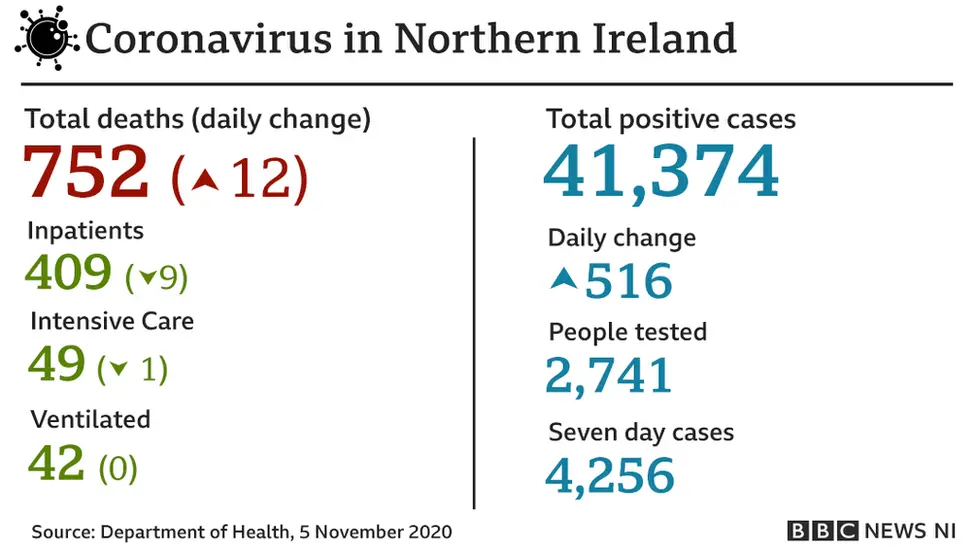

On Tuesday, the chair of the British Medical Association (BMA) in NI, Dr Tom Black, said reopening hospitality would be an "act of vandalism" and called for Northern Ireland to implement a second lockdown.
However, the DUP's Sammy Wilson called Dr Black's comments "totally irresponsible" and that he hoped the executive "ignore his one-sided view".
"It's OK for a well-heeled doctor to talk about ignore the economic consequences of a closedown, it's another thing for the people who are going to be the victims of that, to have to live with it," he said.
Infrastructure Minister Nichola Mallon called the East Antrim MP's remarks "abhorrent" and "dangerous" in a social media post.
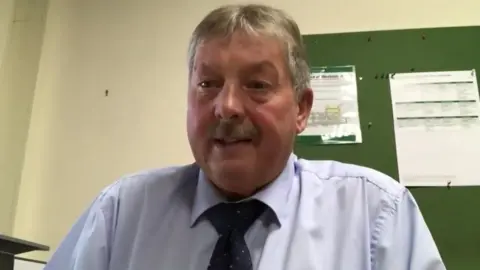
Speaking ahead of Thursday's executive meeting, First Minister Arlene Foster said it was "important we keep our heads in all of this and move forward together".
She would not be drawn on comments by Mr Wilson and Dr Black, but said she had to take in "all opinions" and then look at where Northern Ireland moves as a society.
Allow X content?
Health officials have stressed that more action is needed now to prevent the health service being overwhelmed.
However it is understood that ministers will be asked to consider providing further targeted support for the sector if the restrictions remain in place.
In London, the chancellor has confirmed that furlough will remain in place for all of the United Kingdom until the end of March after England began a second lockdown earlier on Thursday.
The Republic of Ireland is also under its highest tier of restrictions until the end of this month.

In other coronavirus-related developments in Northern Ireland:
- Northern Ireland's StopCovidNI contact tracing app has now been downloaded more than half a million times since its launch in July
- Northern Ireland is to get £400m in additional funding from the Treasury to tackle Covid-19, bringing the total amount of money given to the NI Executive to manage the pandemic to £2.8bn
- Rhonda Tait, whose mother died with coronavirus in April, has made an emotional appeal for people to follow Covid-19 guidelines as she features in a new government advertisement
- Elective surgery has been cancelled at Craigavon Hospital as it expands its intensive care capacity
- Learner drivers in Northern Ireland who had tests cancelled because of the pandemic will be given priority access to re-book an examination.

Meanwhile, figures from the BBC's data unit shows that Northern Ireland's Covid-19 infection rate is falling.
At one stage, the Derry and Strabane council area had the highest infection rate in the UK, with Belfast also featuring in the ten council areas with the worst rates.
However, according to BBC data, both areas have seen drops in the infection rate. And most other council areas in Northern Ireland have similarly seen infection rates fall.
In the middle of October, the rate for Derry-Strabane was more than 1,000 cases per 100,000 population. By contrast, it now stands at 349 cases per 100,000 population.
This represents one of the largest drops in infection rate in the UK. Belfast, Antrim and Newtownabbey, and Mid Ulster have also seen significant drops in infection rate.
ICU figures still high
However, other figures temper this positivity.
While hospital admissions have fallen slightly over the past week - with a small decrease in the number of in-patients - the number of Covid patients currently in Northern Ireland's Intensive Care Units remains high.
The Department of Health's figures indicate that 50 Covid patients are in ICU. That is equivalent to the peak seen in mid-April.
The department also provides a rolling seven-day average for the Covid-19 death rate in Northern Ireland. This rose in the past two weeks, but now is relatively stable - currently running at an expected 8 deaths per day. The comparable figure for April's peak was 14.
